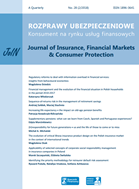Mechanizmy ochrony konsumenta seniora w regulacji o odwróconym kredycie hipotecznym
Protection of an elderly consumer in reverse mortgage regulation
Author(s): Magdalena PalecznaSubject(s): Business Economy / Management, Law on Economics
Published by: Rzecznik Finansowy / Fundacja Edukacji Ubezpieczeniowej
Keywords: reverse mortgage;consumer protection;consumer;an elderly consumer;
Summary/Abstract: Beneficjentami usługi odwróconego kredytu hipotecznego z założenia powinny być osoby starsze. Ideą tej usługi jest wsparcie finansowe seniorów poprzez monetyzację kapitału zakumulowanego w nieruchomościach. Specyfika usługi odwróconego kredytu hipotecznego wymaga zapewnienia ochrony interesów (prawnych i ekonomicznych) korzystających z niej konsumentów. Ustawodawca wprowadził szereg rozwiązań mających na celu ochronę konsumentów, co zostało wskazane w niniejszym opracowaniu. Uprawnienia te są analogiczne do rozwiązań przyjętych w ustawie o kredycie konsumenckim. Ochrona konsumenta seniora może zostać zapewniona poprzez: wypełnianie obowiązków informacyjnych przez kredytodawców, prawo odstąpienia od umowy przez konsumenta, prawo do przedterminowej spłaty kredytu, a także wypowiedzenie umowy kredytowej w ustawowo wskazanych przypadkach. Ocena efektywności i skuteczności tych mechanizmów jest utrudniona, ponieważ banki nie oferują i nie udzielają odwróconego kredytu hipotecznego (spowodowane jest to wysokim poziomem ryzyka). Celem niniejszego opracowania jest przedstawienie mechanizmów ochrony prawnej konsumentów seniorów na gruncie ustawy o odwróconym kredycie hipotecznym oraz wskazanie, czy mechanizmy te są odpowiednie i gwarantują odpowiedni poziom ochrony konsumentów. Reverse mortgage credit is a financial service that is intended to benefit the elderly in principle. The idea of this service is to support senior consumes financially by monetizing the capital accumulated in real estate. The specificity of the reversed mortgage credit service requires the protection of the interests (legal and economic) of consumers using this service. The legislator has introduced a number of solutions aimed at protecting consumers which are depicted hereto. These rights are analogous to the solutions adopted in the Consumer Credit Act. The protection of seniors may be ensured by: fulfilment of information obligations by creditors, the consumer's right to withdraw from the agreement, the right to repay the credit early, as well as the right to terminate the credit agreement in the cases provided for in the Act. It is difficult to assess the effectiveness and efficiency of these mechanisms because banks do not offer and do not provide reverse mortgage credit (due to the high level of risk). The aim of this study is to present mechanisms for legal protection of senior consumers under the Act on Reverse Mortgage Loans and to indicate whether these mechanisms are adequate and guarantee an appropriate level of consumer protection.
Journal: Rozprawy Ubezpieczeniowe. Konsument na rynku usług finansowych
- Issue Year: 2/2019
- Issue No: 32
- Page Range: 16-28
- Page Count: 13
- Language: Polish

